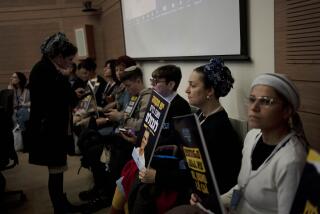Waite Under ‘Arrest,’ Shia Leader Says
- Share via
AMMAN, Jordan — The leader of the major Shia Muslim force in Lebanon said Monday that he believes that Anglican Church envoy Terry Waite, who traveled to Beirut to help arrange the release of foreign hostages, has been “arrested” by the hostages’ captors.
At the same time, the pro-Iranian captors said they will kill American hostages Terry A. Anderson and Thomas Sutherland if the United States attacks Lebanon.
The threat, in the name of the Shia Muslim group known as Islamic Jihad, was contained in a typewritten statement delivered to the offices of a Western news agency in Beirut. It was accompanied by a photograph of Anderson, the chief Middle East correspondent of the Associated Press.
Meanwhile, the captors of three other Americans and an Indian-born U.S. resident said their hostages have been moved out of Beirut “to different secure areas,” and they threatened to kill all four unless Israel frees 400 Arab prisoners within a week.
That threat was contained in a note sent to a Western news agency and a newspaper in Beirut by a new extremist group, which calls itself the Islamic Jihad for the Liberation of Palestine. It seized the four--all employees of Beirut University College--on Jan. 24.
Nabih Berri, who is Lebanon’s justice minister and head of the Shia Muslim militia known as Amal, told journalists in Damascus, Syria, that he believes that Waite was arrested by the extremists he had gone to meet. He gave no details, however.
No Word Since Jan. 20
Waite, personal envoy of Archbishop of Canterbury Robert A. K. Runcie, is believed to have been instrumental in arranging the release of other Americans held hostage by Muslim terrorists in Lebanon. On his current trip, he has been negotiating on behalf of Anderson, 39, and Sutherland, 55, who have been held for many months by Islamic Jihad (Islamic Holy War), a faction believed loyal to Iran. He has not been heard from since he left a Beirut hotel Jan. 20.
In Damascus on Monday, Syrian officials reportedly met with representatives of Iran and a number of Lebanese militias in an effort to arrange Waite’s release. Walid Jumblatt, who heads the Druze militia group that had been providing protection for Waite, told newsmen he was “terribly worried” about Waite. He said he had received no response to his offer to trade places with Waite.
In London, Runcie confirmed that he has appealed to the Speaker of the Iranian Parliament, Hashemi Rafsanjani, for help in finding Waite.
Waite is believed to have been on his way to visit Anderson and Sutherland. Anderson was abducted in March of 1985; Sutherland, dean of the School of Agriculture at the American University of Beirut, was abducted three months later.
Eve Keatley, a spokeswomen for Runcie, said of Waite: “We have no information at all. We have as yet no firm information he is being held against his will.”
Berri, the Amal leader, echoed the warning in the statement by captors of Anderson and Sutherland. “We warn the United States,” he said, “that any attack will mean the fastest way to have anyone, everyone, killed. The situation is serious.”
This threat was apparently in response to the Reagan Administration’s decision last week to send the aircraft carrier Nimitz and other elements of the 6th Fleet into the eastern Mediterranean.
The Syrian government also cautioned the United States against taking any military action in the region. The government newspaper Tishrin warned Washington that it was “playing with fire.”
While U.S. officials in Washington emphasized that the Reagan Administration had no immediate plans to strike against Lebanon, Arab officials in the Middle East were becoming increasingly alarmed by the drama being played out in Beirut, Damascus and Tehran. The State Department order last week putting Lebanon off-limits to U.S. citizens was seen by many as a possible prelude to an American attack.
The original Islamic Jihad said in its statement: “Any military attempt against the Muslims in the region, particularly in Lebanon, will result in the death of the captives and America’s interests in the region. Our answer will be cruel. We shall have no mercy.”
The group said that “unless our known demands, which we have repeatedly advertised, are met, we shall persist in confronting America and its allies in the region in various spheres until all our demands are fulfilled.”
The group has repeatedly demanded the release of 17 people, mostly Iraqi and Lebanese Shia Muslims, who are imprisoned in Kuwait for taking part in attacks against the U.S. and French embassies there in December of 1983.
During last week’s Islamic summit conference in Kuwait, there was speculation that negotiations were under way on a prisoner exchange, with Shia groups in Lebanon handing over all their foreign hostages in exchange for the 17 held as terrorists in Kuwait. But the abduction in Beirut of the three additional Americans and the Indian was said to have disrupted the discussions.
The U.S. decision to move the 6th Fleet ships into the eastern Mediterranean was apparently in reaction to those four abductions.
Israel announced Sunday, and repeated Monday, that it will not even consider the demand.
In Damascus, the officially controlled Syrian press began an organized campaign against the movement of the U.S. ships and linked it with the hostage situation in Lebanon.
“We are against terror and against the abduction and detention of civilians,” the newspaper Tishrin said. “But that does not provide a justification for a superpower like the United States to mount a reckless attack that might kill innocents, including the hostages.”
The newspaper Al Baath, an organ of the ruling Baath Party, said the ship movements were “taking on seriously provocative dimensions.”
More to Read
Sign up for Essential California
The most important California stories and recommendations in your inbox every morning.
You may occasionally receive promotional content from the Los Angeles Times.










